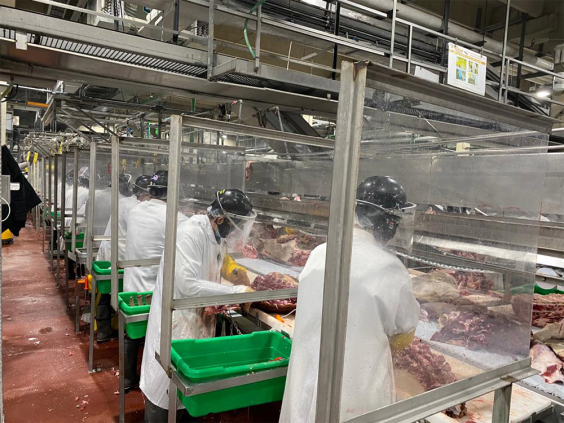U.S. Meatpackers Try Air Cleaning Tech After COVID-19 Outbreaks

Two of the world’s largest meatpackers have installed ultraviolet air cleaning equipment in some U.S. plants, as pressure mounts on food companies to protect workers amid growing concerns about airborne transmission of the coronavirus
Reuters
JBS USA, owned by Brazil’s JBS SA (JBSS3.SA) and one of four major U.S. beef processors, said it installed “ultraviolet germicidal air sanitation” equipment in plant ventilation and air purification systems that use a specific frequency range of light waves to kill germs.
Tyson Foods Inc (TSN.N), which produces beef, pork and chicken, said it is doing extensive research on air flow and testing ultraviolet air treatment systems across several plants.
It is not known whether such technologies kill the new coronavirus.
“The World Health Organization last week acknowledged “evidence emerging” of the airborne spread of the novel coronavirus”
The moves underscore the mounting pressure to protect workers in the U.S. meat industry, which has seen more than 16,000 plant employees in 23 states infected with COVID-19 and 86 worker deaths related to the respiratory disease.
Plant employees and their families have said processors like JBS and Tyson Foods told sick workers to show up at plants, and moved too slowly to protect them with social distancing and equipment like masks.
As worker infections grew, so have meatpackers’ legal problems. In one case, the family of a Pennsylvania man who died from COVID-19 sued JBS USA parent company JBS SA for failing to protect him at the meat plant where he worked.
Low temperatures, which generally allow viruses to survive in the air longer, and crowded working conditions have made meatpacking plants global coronavirus hotspots.
In Germany, a COVID-19 outbreak forced meatpacking plants to review infection risks posed by their cooling systems. One meatpacker had to install high-efficiency HEPA filters typically used in hospitals before being allowed to reopen on Friday.
The World Health Organization last week acknowledged “evidence emerging” of the airborne spread of the novel coronavirus.
The U.S. Centers for Disease Control and Prevention has recommended meat companies consider consulting engineers to ensure adequate ventilation in work areas, but has not required changes to air systems.
JBS told Reuters it also installed “plasma air cleaning technology” in U.S. plants that uses bipolar ionization to neutralize particulates in the air, including virus cells and bacteria.
The company said it is still collecting data on how well the air treatment system works.
Some rivals are holding off. Privately held chicken company Perdue Farms said it has not made any ventilation changes because it has not seen scientific data that shows the virus is spread through industrial air systems. Employees are wearing masks and practicing social distancing for protection, according to the company.












